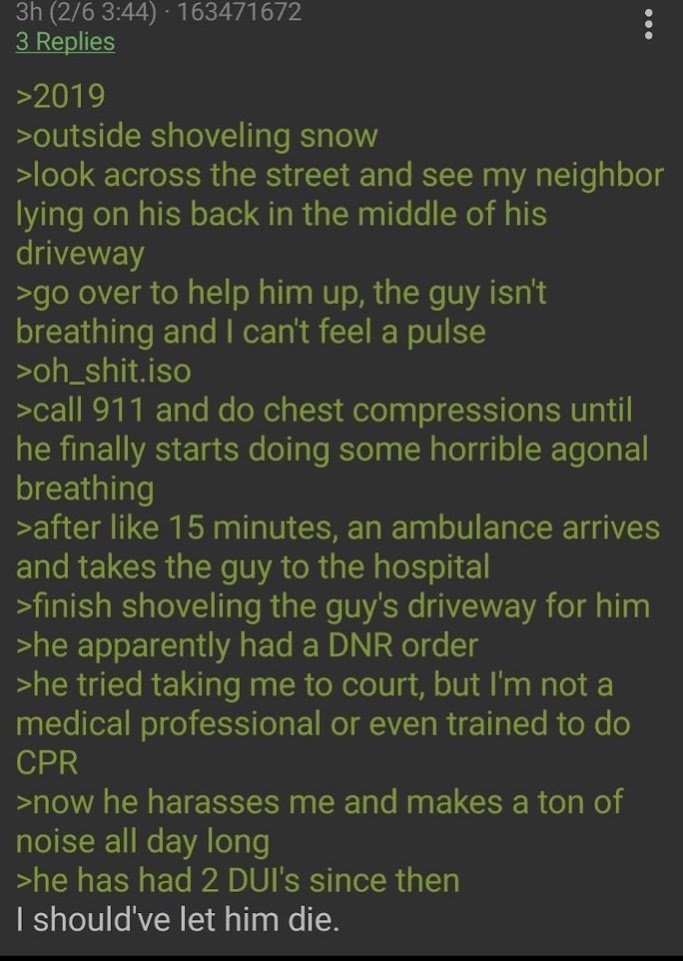this post was submitted on 09 Sep 2024
671 points (99.3% liked)
Greentext
3982 readers
1736 users here now
This is a place to share greentexts and witness the confounding life of Anon. If you're new to the Greentext community, think of it as a sort of zoo with Anon as the main attraction.
Be warned:
- Anon is often crazy.
- Anon is often depressed.
- Anon frequently shares thoughts that are immature, offensive, or incomprehensible.
If you find yourself getting angry (or god forbid, agreeing) with something Anon has said, you might be doing it wrong.
founded 11 months ago
MODERATORS
you are viewing a single comment's thread
view the rest of the comments
view the rest of the comments

I don't really understand DNR. Why not get medically assisted suicide? Or heck, just end your own life?
Seems better than dying a painful, gradual death as your organs shut down from cancer or something.
DNR is more for unexpected death. Planned death, such as suicide (whether medically assisted or not), still requires a DNR.
The only way a DNR is applicable is if the party who is performing the life saving is aware of the order (generally medical professionals). Unless you have it tattooed on you or something, how could a random person know not to try to save your life.
If the green text in the OP is true, I have no idea what their lawyer was thinking. There's no way to win that argument.
By the time paramedics arrived, the patient was alive by way of this passerby resuscitating them already. Even if the paramedics were aware of the DNR, it no longer applies because the patient is alive. So reasonable measures to keep them alive are appropriate. As long as they don't flatline again, the paramedics are in the clear.
I'm any case, DNR has a place. Including for those that don't want to die, but understand the aftermath of CPR is pretty unpleasant (broken ribs, for a start). So rather than suffer through the recovery from CPR, they have a DNR, so that if they go, that's it.
They're not in pain, nor seeking death, they just don't want to suffer through the trauma and recovery of CPR and related procedures.
This is very separate from palliative care, though most of the time they overlap. Palliative care is basically comfort care for people near death. Often palliative patients have a DNR, but not always.
Additionally, on the subject of palliative care, anyone who is not of sound mind, cannot consent to medically assisted suicide, and nobody can consent for them. So in any case where there is a mental aspect, such as dimentia, Alzheimer's, etc, such procedures are impossible. Even a power of attorney cannot consent on their behalf, one of few things that a POA cannot do on the patients behalf.
Beyond that, medically assisted suicide isn't legal everywhere.
We don't know where the poster is.
Palliative care, DNR, and medically assisted suicide are all parts of the equation, all with different purposes, frequently related, and often are administered together.
Source: my father died in January of 2022. He long started his desire to not become a burden like his mother was (Alzheimer's). His most frequent statement on this was that if he were to go "that way" to simply "hand him a gun and he would take care of the rest". By the time my brother and I realized he had "gone that way", he was too far gone to be able to do that, and too far gone to pass the required psychiatric exam to be eligible for medical assistance in the matter. He had to be put in a care home and we quickly got him a DNR. He was in there for... I think 5+ years? Before passing away "naturally". For us, he died a long time prior to his body giving out, and we would visit his corpse in the nursing home from time to time.
My condolences for your father. That sounds like a lot of years to live through a really bad situation for everyone involved. :(
Thanks for the extra info on DNR. I think I understand now.
My pleasure. My dad had his flaws, but he tried to do right whenever he could.
He survived polio, and after he was told by doctors that he would be lucky to walk again, he not only was walking right up until he was admitted into the nursing home (and for nearly a year after too), but he also was able to drive, both a car and a motorcycle, and he learned to fly a plane, stuff that the doctors would have said would be impossible for him.
He was a teacher in a local highschool and taught computers in the 80s and 90s, into the 2000s, when he retired from teaching. Because of this, we always had a computer at home, which is how I learned, and I work in IT support now, in no small part because there was always a computer at home. Even back in the days of DOS....
Sounds like a really impressive dad. :)